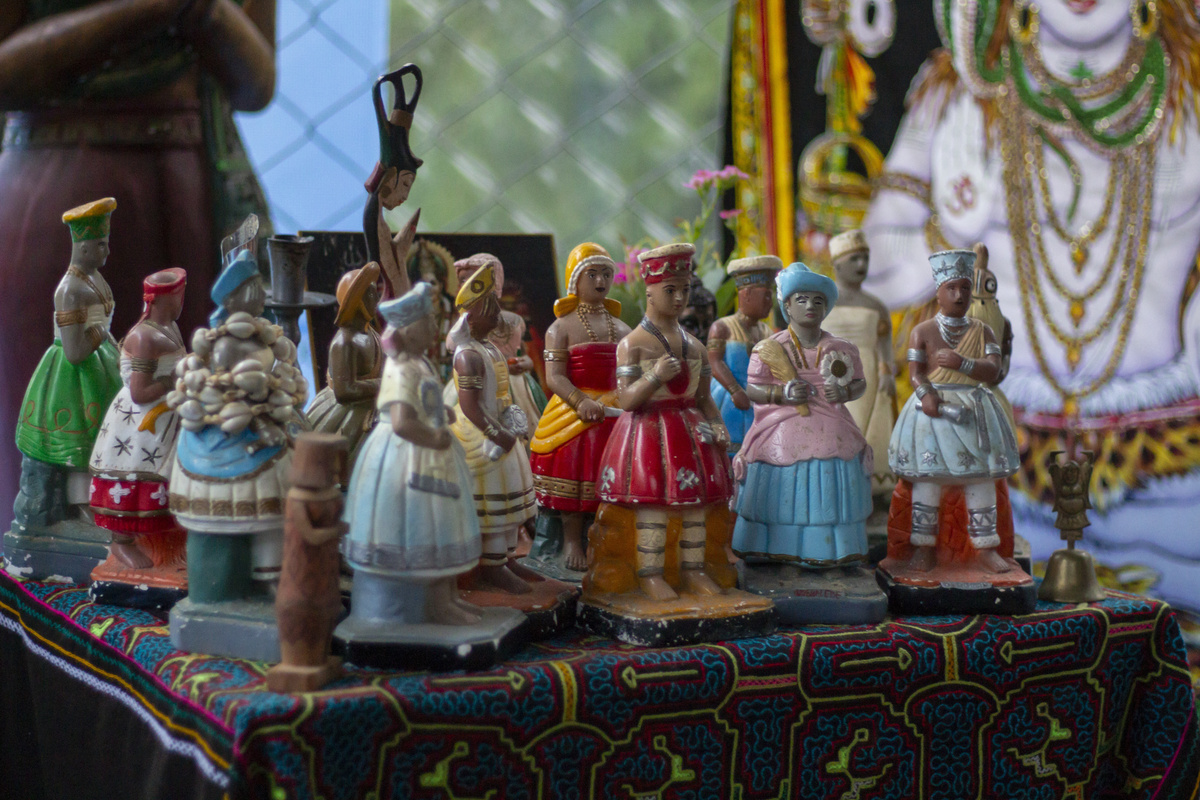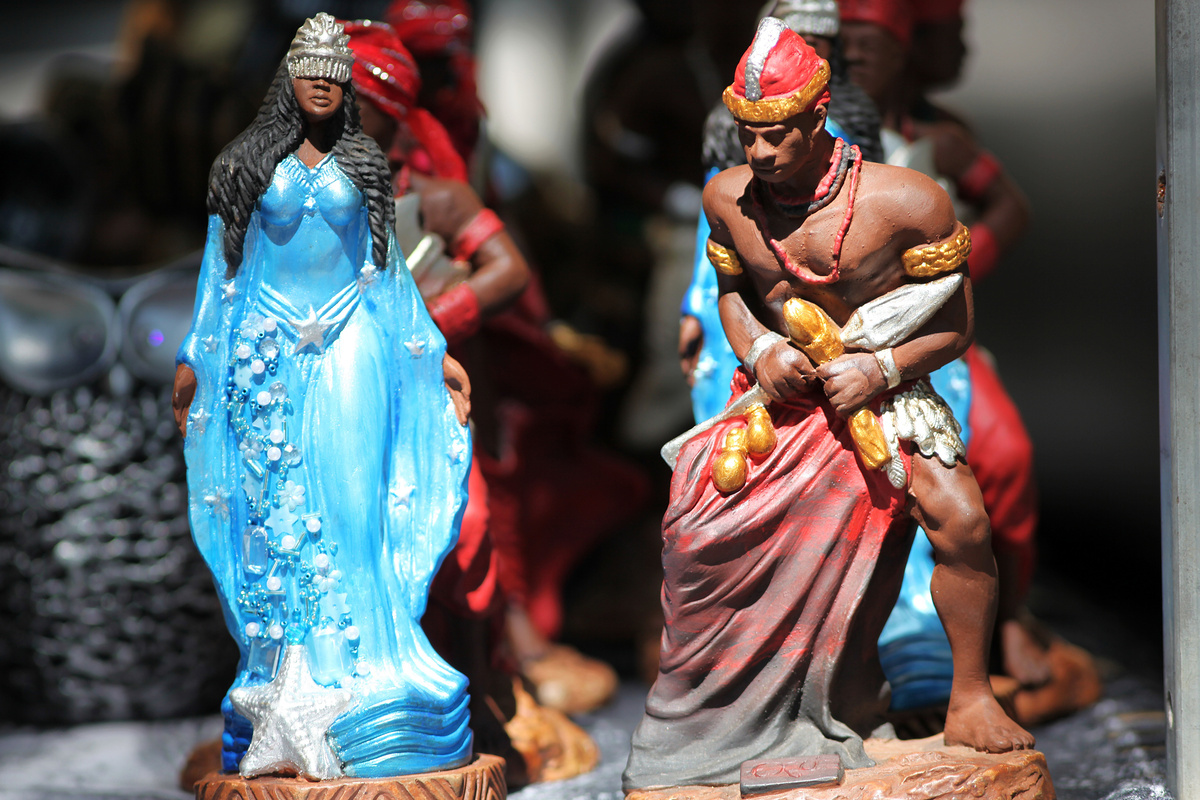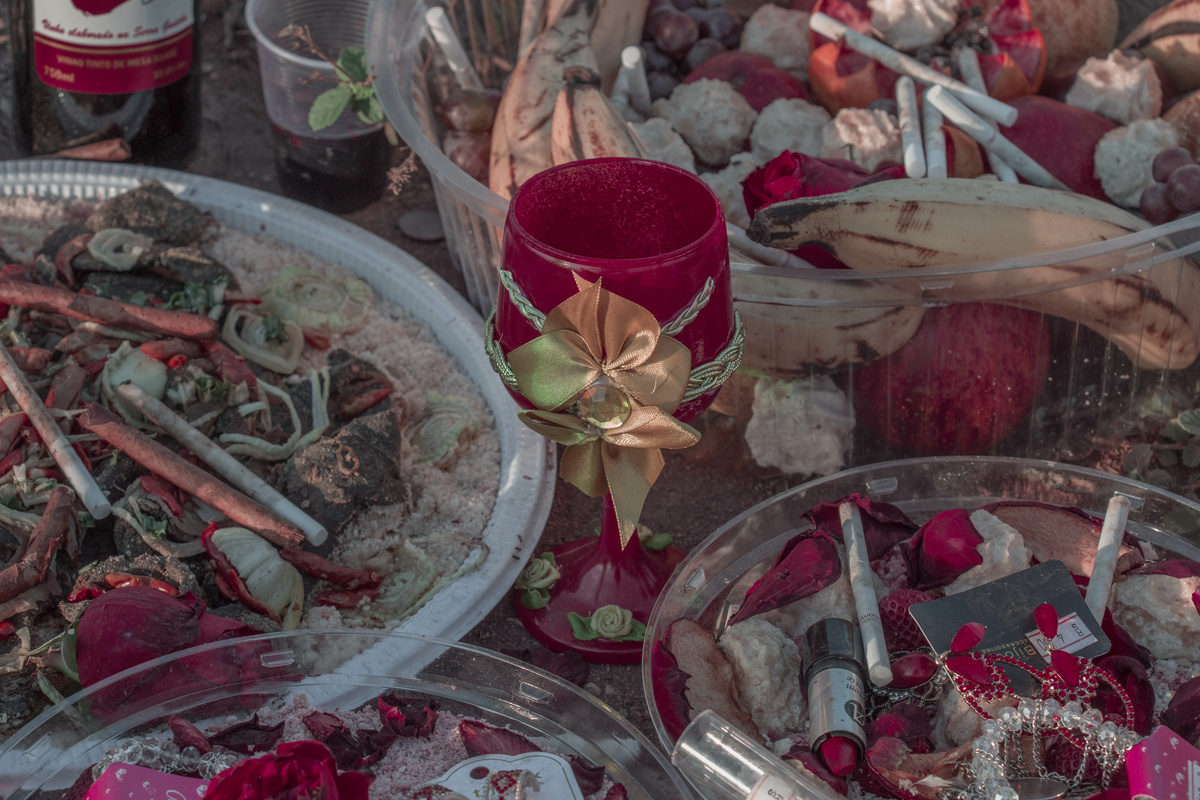Table of contents
General meaning of Xango Aganju for Umbanda

The orixás have African origins and are seen as gods because they represent the forces of nature. Among many orixás, there is Xangô Aganju, worshiped in Umbanda and associated with Xangô. Aganju is the orixá of justice, of the quarry, of the mountains and of volcanoes. From this, Xangô is characterized by being rigid, strong, quarrelsome, temperamental and warlike.
It is noteworthy that all people are daughters of orixás and receive the protection of these divinities. Thus, each person has three main orixás. Below, we will see how to discover which orixá you rule, who is Xangô Aganju, what are their main characteristics, qualities, curiosities and myths, what is the influence of the orixá in your life and more!
How to discover the first, second and third Orixá

Below, see how to discover the first, second and third orixá and see which is the one that rules you. But before that, it is important to know what are the orixás. Check!
What are the Orixás
Orixás are deities that come from the Yoruba tradition, of African origin. The orixás carry with them divine forces and vibrations that show themselves in the elements of nature, such as: fire, water, earth, air, metal, mineral, etc.
In addition, they have many virtues, such as: wisdom, love, justice, knowledge and revolution, being characteristics that mark each deity. Within Umbanda, there are several orixás, such as: Xangô, Iansã, Ogum, Oxóssi, Oxalá, Iemanjá and many more.
In this way, the orixás are worshipped gods that represent the elements of nature. The major god within the orixás is Olodumaré, who brings together all of these energies seen above.
How to discover which Orixá rules me
To find out which is your orixá, it is necessary to talk to a saint father or mother. From this, it becomes possible to know which orixá rules you.
It is common and traditional, in temples where orixás are worshipped, to play the cowrie shells in order to know the initiate of an individual and which is his orixá of head. With this, you can ask for the blessing of your orixá and wish that it protects you and opens your paths to face the challenges of life.
The first Orixá
The first orixá is connected to the mental, to the head. That is, this orixá is the one who guides the individual throughout life, giving this person direction and discernment during this incarnation. So, the orixá is in charge of accompanying this person during his trajectory here on Earth.
Thus, the orixás are divinities that guide the human being on the earthly plane, but this occurs through vibrations and energies, both of the individual and of the divinities.
The second Orixá
The second orixá is related to balance and strength, so he helps during a person's journey in life.
This orixá helps the individual to make better decisions and enlightens his thoughts and emotions so that he does not get lost along the way. If he does get lost, the orixás help him to return to his journey so that he can learn from his mistake and his loss.
The third Orixá
The third orixá is connected to the ancestral plane. That is, it accompanies the individual in all incarnations and is always with him. In this way, the orixá appears from the moment the spirit is created. For women, the divinity is usually feminine. For men, the divinity comes in masculine form. So, the orixá has the function of guiding the human being, whether on the earthly or spiritual plane andancestor.
Who is Xangô Aganju, characteristics, history and origin

Xangô Aganju is considered an older Xangô. His origin is African and he has a strong sense of justice. Below, we will see who Aganju is, what is the history and origin of this orixá, how to prepare foods for him and much more. Check it out!
Who is the Orixá Xangô Aganju
The orixá Aganju is an older Xangô. He has association with Xangô due to his history and origin. Aganju is known as the Lord of volcanoes, thunder, lightning, mountains and quarries.
Thus, this orixá lived inside a volcano, having within itself an innate and uncontrollable force. In this way, Aganju has fire as its element, being an orixá that carries with it heat and the instinct to fight and survive.
Therefore, Xangô Aganju brings to each individual the opening of paths, justice, strength and victory against enemies. He breaks barriers, opens gates and does everything that can be applied to justice and to each individual.
Xangô Aganju as a quality of Xangô
At another time, a quality and path of Xangô was created called Aganju, which today is known as Xangô Aganju.
This is because Xangô and Oxum made a pact to have equal rights over the children of Aganju. So whenever they could not speak directly to their father, they would speak directly to Xangô and Oxum.
This pact occurred because Xangô tried to bring the rebellious people closer to their king (Aganju), who later found out that the sons became rebellious because they could not approach their father, since Aganju lived inside a volcano and could burn the sons. Then, in the diaspora, Aganju became Xangô Aganju.
The main characteristics of Xangô Aganju
The main characteristics of Shango Aganju include being uncontrollable, fearless, hot, strong, rigid and explosive. The orixá is a defender of oppressed and enslaved individuals. Therefore, he carries in his essence the sense of justice. For Aganju, no battle is lost.
Another strong characteristic of Xangô Aganju is his strong personality. People who are ruled by this orixá are endowed with great leadership power and intelligence. His children possess the characteristics of their father and are therefore also great articulators and quite demanding.
The history and origin of Xangô Aganju
Xangô Aganju is an orixá who is related to Xangô, Ogum and Yansã. He is also related to the Oyó tradition. According to tradition, Dada Ajacá is the blood brother of Xangô and ruled Oyó. Ajacá was very apathetic, peaceful and did not rule well.
Then, Xangô realized this and dethroned his own brother, becoming the king of Oyó. After that, Ajacá was exiled and assumed the throne in another city near Oyó. He married and had a son: Xangô Aganju, Xangô's nephew. From this, Xangô continued his reign for seven years.
Xangô, unhappy with the atrocities committed and with a revolted people, abandoned the throne and committed suicide. After that, Ajacá returned to Oyó and reassumed the throne, becoming king. After his death, his son, Xangô Aganju, took over.
The meaning of Aganju
Xangô Aganju is the Lord of justice, mountains and volcanoes. Aganju can mean "firm ground", like someone who has his feet on the ground. Also, his element is fire and represents what is most explosive in the world, that which has no control, and once it spreads, it is difficult to control.
However, "terra firma" not only represents his strong connection with volcanoes, fire and nature. It represents his emotions and his way of acting: besides being determined and fearless, Aganju is concerned and always seeks justice, being a very correct orixá.
Qualities of Xangô
The qualities of Xangô are many. He is very fair and correct in his actions and attitudes. Even though he has a very explosive and impulsive side, Xangô always acts according to his character. Always in search of justice, he represents what is fairest in the universe and has a high dose of energy and self-esteem, which makes him a somewhat self-centered orixá.
When he is contradicted, he can become violent and aggressive. Other qualities of Xangô involve him being intelligent, wise and warlike, having good arguments and never committing an injustice.
How to prepare food of Xangô
Preparing good food for Xangô is simple, just pay attention to what he likes. This orixá loves fruits like passion fruit, melon, persimmon, lemon, etc. Another tip is foods that have dendê, okra, sweet olive oil, shrimp and honey. You can also prepare the Amalá, which is a food that Xangô likes a lot.
Amalá takes the following ingredients: okra, dendê oil, honey, large onions, dried shrimp, gamela, and a pot. It's simple to make and quick, and it's also a way to prepare a Xangô food.
The Xangô Aganju in the Santeria of Cuba
Cuban Santeria is rooted in Yoruba and carries elements of religious syncretism. From this, Aganju is seen as the father of Xangô and identified as St. Christopher. His clothing is few and his colors are in red and dark. He wears necklaces that are brown and made from elements of nature.
Moreover, their sons are characterized by being violent men with difficult and powerful temperaments. However, by tenderness, they can be disarmed and become docile and gentle men. They become friendly to both women and children.
Influence, offering, prayer and curiosities about Xangô Aganju

Xangô Aganju is a very respected orixá in Umbanda. He is a born vigilante and has great influence in the lives of his followers. In addition, he likes to receive offerings and to see that his followers pray for him. So, check out several ways to relate to Xangô Aganju below!
The influence of Xangô Aganju in the lives of his followers
The influence of Xangô Aganju in the lives of his followers is great, precisely because Aganju represents what is most human in individuals, such as strong temperament, explosive side, strength, justice, protective instinct and more.
Besides representing what is noblest in human beings, such as the thirst for justice, Aganju also has character and a great power of resilience. Thus, the orixá influences the followers directly, with his qualities and his defects. Thus, with this influence over them, it becomes possible to achieve their goals and achieve success in life.
Offering to Xangô Aganju
A simple offering to Xangô Aganju can be made with the following ingredients: six bananas and a can of black beer (the beer needs to be this color and can be in a can or bottle). To begin, find a place that has plenty of bush or greenery. After that, place a piece of paper on the ground to support the ingredients.
Then, place the six bananas on top of this paper. While placing them on the base, mentalize and ask Xangô Aganju to open your paths and protect you from all evil.
Finally, place the beer next to the bananas and offer it to Xangô Aganju. It is important to say words of thanks and make requests.
Prayer to Xangô Aganju
If you wish to contact Aganju, either to give thanks or to make requests, you can recite the following prayer:
Ô Xangô Aganju!
O Lord of Justice
Let what is just fall under me
And drive away all enemies from me
Ô Xângo my father of umbanda
On the mountain top you do justice
Open my ways and accompany me through eternity
Ô Xangô Aganju in your kingdom what vibrates is fire
O father of justice, protect me as you protect your subjects
Xangô Aganju, I ask you to enlighten my thoughts
To make correct and fair decisions
Ô Xangô Aganju, justiceiro and warrior
Give me some of your wisdom and strength
To cure me of all evil and bad energy
That I may prowl
Amen!
Curiosities
There are many curiosities about Aganju that exist. For example, in Brazil, Xangô and Xangô Aganju are worshiped together. This is because Xangô, at one time, arrived at the bank of a river and discovered that, after him, there was a people without a king.
So, Xangô went to the possible king and tried to talk with him to bring the two kingdoms together. Xangô was told to make an offering by the river, and when he went to make this offering, he heard a thunderous thud. He saw Oxum and Aganju, a huge giant made out of a fireball. That's when Xangô approached and Aganju asked what he was doing there.
Xangô said he wanted to cross the river. Aganju then uprooted a tree and made a bridge for Xangô to cross. Immediately, an identification took place between the two.
Myths about Aganju
In some myths, Xangô Aganju has a different appearance from what is known because, in the story, he wears braided hair and a red skirt. Also, according to mythology, Aganju throws a huge ball of fire at his enemies by means of lightning.
However, the lightning stone is a way to represent the body of Xangô, which, in this case, has its symbolism. Finally, another myth of the orixá says that he would have been the fourth king of Oyó and, according to mythology, he was the most powerful and explosive king of the Yoruba empires.
After all, are there differences between Xangô and Xangô Aganju?

In many traditions, Xangô Aganju is worshipped along with Xangô. In other traditions, they are different deities. Aganju was a king of Oyo and so was Xangô, but at different times. However, they are different deities, but they resemble each other.
Thus, Xangô is the Lord of laws and patron of intellectuals. He is considered a true warrior and wise man, generating power of justice and politics. On the other hand, there is Xangô Aganju, who is the orixá of justice and Lord of thunder, lightning and fire.
Both Xangô and Aganju are orixás that represent fire, thunder and lightning - everything that cannot be controlled and everything that comes from nature. They are uncontrollable, strong, warlike, quarrelsome deities.
However, Aganju is even more rigid, uncontrollable and hot-tempered than Shango. Both are of the element of fire, but they are not the same deity, they just have similarities.

